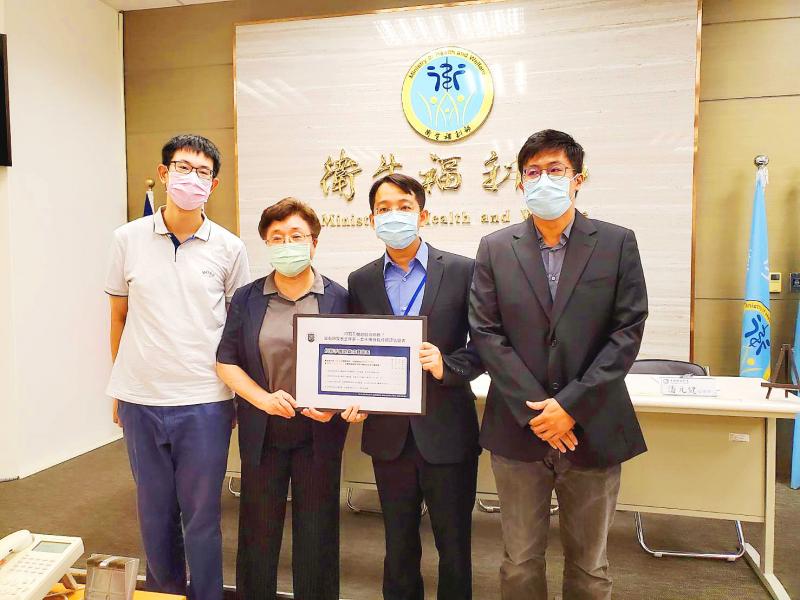The National Health Research Institutes (NHRI) yesterday said it has developed the world’s first questionnaire to help people assess whether they have problematic mobile gaming (PMG) behavior.
Gaming disorder was classified as a mental health condition in the International Classification of Diseases (ICD-11) published by the WHO in 2018, said Lin Yu-hsuan (林煜軒), a National Taiwan University Hospital psychiatrist and assistant research fellow at NHRI’s Institute of Population Health Sciences who led the research.
As the Internet has become ubiquitous and sales of mobile games have rapidly increased, mobile game addiction is gaining more attention in the field of online game addiction research, he said.

Photo: Lin Hui-chin, Taipei Times
Lin, along with psychologist Pan Yuan-chien (潘元健) and Chiu Yu-chuan (邱于峻), a physician at Mackay Memorial Hospital’s psychiatry department, developed the self-reporting questionnaire, which comes in two versions — 12 questions and four questions — using a four-point Likert scale to evaluate PMG symptoms.
Respondents are asked to answer questions about their mobile gaming behavior in the past three months, with those scoring more than 10 points in the short version likely having problematic mobile gaming habits, he said.
The questions include: I have had dry/sore eyes, sore muscles or other types of discomfort due to mobile gaming; I often cannot help picking up my phone to play mobile games for a while even if I did not plan to; In the past three months, I have felt the need to play mobile games more frequently or for longer periods; and, I feel uneasy or irritated if I cannot play mobile games.
The three factors of addiction assessed in the questionnaire are: compulsion, tolerance and withdrawal, Lin said.
“The first factor, compulsion, checks to see if the person overindulges in this type of behavior, which results in negative effects such as sore eyes and muscles, gets easily distracted from work or study and cannot help taking out their mobile phone to play every now and then,” he said.
“The second factor, tolerance, checks if the person needs to play more or more frequently, similar to a person’s tolerance for alcohol increasing” over time, Lin said.
“The third factor, withdrawal, checks if the person experiences withdrawal symptoms similar to drug withdrawal, and whether they feel anxious or irritated if they cannot play,” he said.
Using the simplified verison, the research team surveyed 10,775 fourth-grade to senior-high school students, of whom 1,495 scored higher than 10 points, indicating that 13 percent of them likely have PMG, he said.
The team also randomly selected 113 senior-high school students among the respondents for consultations with a psychiatrist and a clinical psychologist about gaming addiction problems, and the diagnoses were consistent with the results of the questionnaire, Lin said.
Their research paper, titled “Development of the Problematic Mobile Gaming Questionnaire and Prevalence of Mobile Gaming Addiction Among Adolescents in Taiwan,” was published in October last year in the academic journal Cyberpsychology, Behavior, and Social Networking.

RESILIENCE: Deepening bilateral cooperation would extend the peace sustained over the 45 years since the Taiwan Relations Act, Greene said Taiwan-US relations are built on deep economic ties and shared values, American Institute in Taiwan (AIT) Director Raymond Greene said yesterday, adding that strengthening supply chain security in critical industries, enhancing societal resilience through cooperation and deepening partnerships are key to ensuring peace and stability for Taiwan in the years ahead. Greene made the remarks at the National Security Youth Forum, organized by National Taiwan University’s National Security and Strategy Studies Institution in Taipei. In his address in Mandarin Chinese, Greene said the Taiwan-US relationship is built on deep economic ties and shared interests, and grows stronger through the enduring friendship between

GAINING STEAM: The scheme initially failed to gather much attention, with only 188 cards issued in its first year, but gained popularity amid the COVID-19 pandemic Applications for the Employment Gold Card have increased in the past few years, with the card having been issued to a total of 13,191 people from 101 countries since its introduction in 2018, the National Development Council (NDC) said yesterday. Those who have received the card have included celebrities, such as former NBA star Dwight Howard and Australian-South Korean cheerleader Dahye Lee, the NDC said. The four-in-one Employment Gold Card combines a work permit, resident visa, Alien Resident Certificate (ARC) and re-entry permit. It was first introduced in February 2018 through the Act Governing Recruitment and Employment of Foreign Professionals (外國專業人才延攬及雇用法),

The Ministry of Transportation and Communications yesterday said that it would redesign the written portion of the driver’s license exam to make it more rigorous. “We hope that the exam can assess drivers’ understanding of traffic rules, particularly those who take the driver’s license test for the first time. In the past, drivers only needed to cram a book of test questions to pass the written exam,” Minister of Transportation and Communications Chen Shih-kai (陳世凱) told a news conference at the Taoyuan Motor Vehicle Office. “In the future, they would not be able to pass the test unless they study traffic regulations

‘COMING MENACINGLY’: The CDC advised wearing a mask when visiting hospitals or long-term care centers, on public transportation and in crowded indoor venues Hospital visits for COVID-19 last week increased by 113 percent to 41,402, the Centers for Disease Control (CDC) said yesterday, as it encouraged people to wear a mask in three public settings to prevent infection. CDC Epidemic Intelligence Center Deputy Director Lee Chia-lin (李佳琳) said weekly hospital visits for COVID-19 have been increasing for seven consecutive weeks, and 102 severe COVID-19 cases and 19 deaths were confirmed last week, both the highest weekly numbers this year. CDC physician Lee Tsung-han (李宗翰) said the youngest person hospitalized due to the disease this year was reported last week, a one-month-old baby, who does not